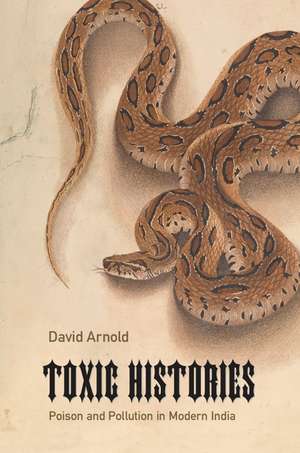Toxic Histories: Poison and Pollution in Modern India: Science in History
Autor David Arnolden Limba Engleză Hardback – 14 feb 2016
Din seria Science in History
-
 Preț: 274.69 lei
Preț: 274.69 lei - 9%
 Preț: 593.40 lei
Preț: 593.40 lei - 9%
 Preț: 592.86 lei
Preț: 592.86 lei -
 Preț: 406.55 lei
Preț: 406.55 lei -
 Preț: 283.25 lei
Preț: 283.25 lei -
 Preț: 189.98 lei
Preț: 189.98 lei -
 Preț: 306.86 lei
Preț: 306.86 lei -
 Preț: 306.30 lei
Preț: 306.30 lei -
 Preț: 324.96 lei
Preț: 324.96 lei -
 Preț: 324.24 lei
Preț: 324.24 lei -
 Preț: 224.62 lei
Preț: 224.62 lei -
 Preț: 243.15 lei
Preț: 243.15 lei -
 Preț: 288.42 lei
Preț: 288.42 lei -
 Preț: 221.56 lei
Preț: 221.56 lei -
 Preț: 206.39 lei
Preț: 206.39 lei -
 Preț: 230.49 lei
Preț: 230.49 lei - 11%
 Preț: 584.57 lei
Preț: 584.57 lei - 11%
 Preț: 585.10 lei
Preț: 585.10 lei - 14%
 Preț: 728.56 lei
Preț: 728.56 lei - 11%
 Preț: 642.35 lei
Preț: 642.35 lei
Preț: 243.95 lei
Preț vechi: 274.18 lei
-11% Nou
Puncte Express: 366
Preț estimativ în valută:
46.68€ • 48.84$ • 38.78£
46.68€ • 48.84$ • 38.78£
Carte indisponibilă temporar
Doresc să fiu notificat când acest titlu va fi disponibil:
Se trimite...
Preluare comenzi: 021 569.72.76
Specificații
ISBN-13: 9781107126978
ISBN-10: 1107126975
Pagini: 250
Ilustrații: 8 b/w illus.
Dimensiuni: 158 x 235 x 17 mm
Greutate: 0.49 kg
Editura: Cambridge University Press
Colecția Cambridge University Press
Seria Science in History
Locul publicării:New York, United States
ISBN-10: 1107126975
Pagini: 250
Ilustrații: 8 b/w illus.
Dimensiuni: 158 x 235 x 17 mm
Greutate: 0.49 kg
Editura: Cambridge University Press
Colecția Cambridge University Press
Seria Science in History
Locul publicării:New York, United States
Cuprins
Introduction: poison traces; 1. The social life of poisons; 2. The imperial pharmakon; 3. Panics and scares; 4. Toxic evidence; 5. Intimate histories; 6. Embracing toxicity; 7. Polluted places, poisoned lives; Conclusion; Bibliography; Index.
Recenzii
'In this meticulous toxicological assay of British India, David Arnold challenges us to rethink how we draw boundaries between the therapeutic and the poisonous, between purity and danger, and between European and Indigenous. Colonialism is refigured as the governance of poisons - and modernity turns into the titrating of toxicities. A revealing forensic study of poison as substance and metaphor under colonial rule, Toxic Histories also shows us how - and why - toxicity became a concept intrinsic to India's modernity. Thus Arnold traces the sad genealogy of our poisoned world.' Warwick Anderson, University of Sydney
'The idea of poison lurks below the surface of much of Indian history but it has rarely been investigated in its own right. In this path-breaking book, David Arnold demonstrates the importance of doing so. Exploring the practical uses and the ideological significance of poisons, Arnold shows how narratives of toxicity became central to the construction and evaluation of India's modernity. Brimming with fascinating insights, there is scarcely any aspect of Indian history which is not illuminated by this book.' Mark Harrison, University of Oxford
'Against the vast backdrop of India's pre-, colonial and post-colonial history, the eminent historian David Arnold asks the provocative question: do different places have their own toxic histories? In an outstanding display of scholarship, in equal measures subtle and sophisticated, full of striking and illuminating historical examples, and written with a clear sense of how his analysis might engage with critical understandings of our own toxic present, Arnold's answer is a satisfyingly complex 'yes'.' Ian Burney, University of Manchester
'Arnold's explorations of poison, pollution, and toxicity are accessible, informative, and quite illuminating … The book does serve as a helpful road map to future scholarship on poison and environmental pollution not only in India but in the rest of our poisoned world.' Eric Strahorn, Environmental History
'The idea of poison lurks below the surface of much of Indian history but it has rarely been investigated in its own right. In this path-breaking book, David Arnold demonstrates the importance of doing so. Exploring the practical uses and the ideological significance of poisons, Arnold shows how narratives of toxicity became central to the construction and evaluation of India's modernity. Brimming with fascinating insights, there is scarcely any aspect of Indian history which is not illuminated by this book.' Mark Harrison, University of Oxford
'Against the vast backdrop of India's pre-, colonial and post-colonial history, the eminent historian David Arnold asks the provocative question: do different places have their own toxic histories? In an outstanding display of scholarship, in equal measures subtle and sophisticated, full of striking and illuminating historical examples, and written with a clear sense of how his analysis might engage with critical understandings of our own toxic present, Arnold's answer is a satisfyingly complex 'yes'.' Ian Burney, University of Manchester
'Arnold's explorations of poison, pollution, and toxicity are accessible, informative, and quite illuminating … The book does serve as a helpful road map to future scholarship on poison and environmental pollution not only in India but in the rest of our poisoned world.' Eric Strahorn, Environmental History
Notă biografică
Descriere
An analysis of the challenge that India's poison culture posed for colonial rule and toxicology's creation of a public role for science.
